- Home
- Sudhir Kakar
A Book of Memory
A Book of Memory Read online
Sudhir Kakar
A BOOK OF MEMORY
Confessions and Reflections
Contents
About the Author
Dedication
Before I Begin
Origins
Of Fathers and Men
A Welcome to the World
Kamla
Rebel in a Known Cause
Identity Crisis
The Resolution
Becoming a Psychoanalyst
A Shrink in Delhi
In Academia and the World
Two Loves
Retreat to the Forest
An Ending
Illustrations
Notes
Acknowledgements
Follow Penguin
Copyright
PENGUIN BOOKS
A BOOK OF MEMORY
Sudhir Kakar is a distinguished psychoanalyst and writer. He has written seventeen highly acclaimed books of non-fiction, which include, among others, The Inner World (now in its sixteenth printing since its first publication in 1978), Shamans, Mystics and Doctors, Intimate Relations, The Colours of Violence and, most recently, Young Tagore: The Makings of a Genius. He has written four novels and his books have been translated into twenty-one languages around the world. Kakar has taught at leading institutions around the world and has won numerous accolades for his work. In February 2012, he was conferred the Order of Merit of the Federal Republic of Germany, the country’s highest civilian honour.
Praise for the Book
‘A big throbbing book about a long eventful life. Essential reading . . .’
India Today
‘Intimate and very personal portrait of the author’s own life, seen through the prism of memory, and filled with a wealth of detail and anecdote’
Indian Express
‘A memoir whose recollections, dreams, wishes, ideas and thoughts mingle with the recapitulation of a life lived well . . . an elegant autobiography by a shrink who narrates how memory and mind shape much of our living consciousness’
Business Standard
‘Honest, almost brutally so . . . and absorbing’
Week
‘One of the delights of Kakar’s memoir is his observation of his own feelings . . . no one has done this better with such finesse as he . . . that rare autobiography without a touch of conceit’
Khushwant Singh, Outlook
‘His superb memoir outlines the making of a modern Indian – how a ruminative and restless mind realized itself in the folds of a vocation of understanding. A Book of Memory somehow makes a gentle read out of Kakar’s bruising candour, buoyed by his fluently meditative and occasionally lyrical prose’
Tehelka
‘The prime movers of A Book of Memory are identity, relationships and as a function of these, eroticism, and Kakar frequently uses his psychiatric insights to address the crises of the first, the dimensions of the second and the imperatives of the third . . . in a series of observations that effectively benchmark our condition . . .’
The Telegraph
‘What helps the narrative to become riveting is that the story recounted is not a linear account but one that meanders just as consciousness does . . . an unputdownable book’
Tribune
‘Holds up a lens of understanding onto the impact of culture on Indian psyche’
Mail Today
‘Could not be more lively, unorthodox and exciting’
Frankfurter Allgemeine Zeitung, Germany
‘He can describe the hardships of the Western soul as well as that of the Indian one, report from Harvard and Frankfurt as well as from Jaipur and Delhi, the perspective of the scholar is as familiar to him as that of the novelist who has explored the extremes of Eros and mysticism in his books’
Die Zeit, Germany
To my children’s children, seeds yet unborn
We do not know the true value of our moments until they have undergone the test of memory.
—Georges Duhamel
Before I Begin
2 February 2009
Goa
The trick to get through the cremation and the rest of the day without breaking down, I told myself, was to keep my attention resolutely focused on my father’s corpse and what was happening to it. Closing all windows and doors to any rush of images from the past.
Dry-eyed, I watched the two men in the living room of our Jaipur house, stripped of all familiarity by death, prepare the bamboo bier and cover it with straw, my ears deaf to the murmured chanting of the priest, the scratchy music from a record of devotional songs playing on a record player in the corner of the room and the wailing of women outside the door. I watched the barber shave my father’s head, a prelude to the ritual washing of the body in which I was supposed to assist. As the priest handed me a moist piece of cloth, I kept saying to myself, though not in these now well-chosen words, ‘Remember, it is a corpse, dead flesh, not the father you revered and adored. Separate the observer from the actor who is sponging the body.’ And yet, I could not help but recoil from my first contact with his ice-cold flesh. My eyes, with a will of their own, refused to be averted from his genitals, the mighty paternal phallus now shrivelled and flopping against a faintly blue thigh.
After the sponging was complete, the body wrapped in a coarse white cloth, I helped to tie it down securely with thick jute strings so it wouldn’t shift or slide off when the bier was carried to the municipal hearse parked outside on the road. The sun was high by the time the hearse, followed by the Ambassador and Fiat cars crammed full with mourners, reached the cremation ground at the foot of Moti Doongri, the fort built at the beginning of the twentieth century by the rulers of Jaipur for pleasure, for love, not war.
My memory becomes stubborn as I try to visualize the cremation. It would rather serve up images of the palace fort, perched on the rocky outcrop of the Aravallis, looming high above the cremation ground, scattered orange and purple bougainvillea peeping through its delicate crenulations. I wonder whether the pleasure of romantic trysts in Moti Doongri was heightened by the daily demonstration of the body’s impermanence in the ground below. I am also aware that this thought is but memory’s ruse to deflect me from excruciating visual images of the cremation.
The hard part was to walk around the pyre with a flaming bundle of dry grass, light the fire near the head and then hasten the consummation by pouring ladles of ghee on the burning pyre. Even after the passage of twenty-eight years I find it difficult to summon the last image: the breaking open of his skull with a long pole by one of the cremation-ground helpers when the body was but half burnt to let the soul escape. My father’s soul. The soul of a man who did not believe in the existence of one. An agnostic who loved life and was impatient with the religious rites that mark its going, but understood that they were only meant to hammer the utter irrevocability of death into the obdurate hearts of those who were left behind.
I was back home, with my sister, my grandmother, my mother’s sisters Kamla and Prem, my father’s three sisters and his two surviving brothers, sitting on the freshly washed floor of our living room stripped of all furniture, when the tears came in a rush. They streamed down my face, vainly trying to fill the abyss that had opened up in my soul.
I woke up this morning in the village of Benaulim in Goa where I now live, feeling low spirited. It took a couple of hours and some cups of tea before I remembered that today is 2nd February, the birthday of my father who died in 1982. Today, he would have been ninety-nine years old. Since his death, I have often dreamt of my father on the eve of his birthday, celebrating it by giving him life in my dream. In the years when the dream has chosen to remain absent, I have woken up in the morning from an uneasy sleep, with a feeling of being weighed down by an unn
ameable burden before I remember, sometimes hours or even a couple of days later, what ailed my spirit. I wonder whether my beginning to write my memoir and my father’s birthday are related events, an ‘anniversary reaction’ of a special kind. When this memoir is published, perhaps two years from now, I will be the same age as my father when he died. Most of us carry a foreboding within us that we will not cross the lifespan of our parents. That it is somehow forbidden for us to have lived longer than them. Is my writing of the memoir also an attempt to address this anxiety? Or is this construction too fanciful? Perhaps. But one should never underestimate the reach and power of the unconscious part of the mind. Responsible for over ninety-five per cent of our mental life, our unconscious mind is not only Freud’s ‘cauldron full of seething excitement’ or Plato’s ‘companion to wild boasts and indecency’ but, on occasion, a precise, even pedantic, calculator.
Why, then, this narrative of my life? Was living it not enough? Why not let the past lie buried instead of excavating and, inevitably, admiring it in the present? I am as aware as the next person of the impossibility of self-portrayal, the unavoidable omissions and self-deceptions of an undertaking whose only commandment is that the narration of the memories of life should not do any real damage to one’s feelings of self-worth. Psychoanalysts are no exception to the rule that people are fairly accurate in their perceptions of others but have distorted perceptions of themselves. I cannot pretend, as some memoirists of earlier and psychologically more innocent times have sometimes done, that I am writing my memoir for the educational benefits of the young. Or that my memories will add to the historical record. Yes, as a psychoanalyst practising for almost thirty years in Delhi, I caught glimpses of the intimate lives of many people important in the eyes of the world: politicians, artists, scholars, journalists, industrialists. I encountered some of them professionally, others through the narratives of their children, spouses or lovers. I have no reason or wish to break the ethical standards of my profession by purveying salacious gossip on the private foibles of public figures. Although written by a shrink, this is not the memoir of a shrink. Except for passing references to a couple of patients from published case histories, none of the men and women who wander in and out of these pages was ever seen professionally.
Is there a degree of vanity involved in writing one’s memoirs? Certainly. All memoirs are also expressions of self-love and there can be no writing of an autobiography for someone who believes with Pascal that the self is hateful. Indeed, some of the most extreme manifestations of self-love, such as Rousseau’s Confessions which considers nothing too trivial or too puerile (such as problems with urination and catheters) so long as it relates to the author, are considered classics of autobiography. My self-love is way below these Rousseauan heights, yet it is still sufficient to engage in this ‘strange task, which consists in speaking of oneself’.1
The autobiographical impulse can also be fuelled by the prospect of avenging the hurts of one’s life, by the pleasures of revenge eaten cold. I am not free of vengeful twinges but the hurts have mostly fallen away with age and no longer have the power to agitate me as they once did. I look back at them with equanimity, though an occasional dream lets me know that the hurt aroused by one or other psychic wound suffered long ago has yet to be completely metabolized. I look upon this memoir as a chance to revive my loves rather than nourish old hates. I want to give life to all who I have loved rather than dig up interred ill wishes towards those who I believe did me harm, even if I am not always successful in this effort.
If there is one predominant motivation in undertaking this memoir, then it is to recapture the sense of life that animated events that stand out in my memory as momentous. A memoir that does not engage with the most emotionally vibrant passages of life will be an account of only half a life, and that too of its most insignificant part.
I did a similar exercise once, long ago, lying on the couch in my personal analysis when I was training to be a psychoanalyst. But that was a reading of a life done by a thirty-year-old experiencing the emotional tumult of unresolved past conflicts under the benign gaze of his training analyst. This reading is by an older man who wants to look back with equanimity and tell the story of passionate moments of a longer past comprising more than his childhood and youth. The recollections are of someone who wants to evoke the special feeling-quality of those moments without which a memoir is but a lifeless record of events. Some of these moments bespeak of inner conflicts without which no stories can be told and, for those with the gift, no poetry can be made. I remain aware, though, that in spite of what some psychoanalysts might believe, I can never really know how it all came about. My life, like the lives of all of us, was moved by unconscious forces which I did not really control and could only partly nudge in directions I may have consciously chosen at its various forks.
Origins
July–October 1943
Lahore
I was born on Monday, 25 July 1938, at 11.40 in the morning in Nainital, a hill station in the Himalayas that now lies in the state of Uttaranchal but at the time of my birth was part of the United Provinces in British India. The precise coordinates of this unremembered event come from my horoscope, which further notes that the local time of sunrise on that day was 5.55. This was to help in determining the exact planetary constellations at the time of my birth. Like any other Hindu child, my link to and specific place in the cosmos was detailed a few days later—in a slim booklet with a pink cover and the picture of god Ganesha sitting bare-chested on a throne, with one of his right hands raised in benediction. It is good that we do not remember the moment of birth and how central we were to the universe at that particular moment. Otherwise, the rest of life would appear as a long downhill slope, which, of course, it may well be.
‘You almost killed your mother!’ my mother’s mother often used to say to me whenever I visited her during my school and college years, mentioning with pride rather than reproach my birth weight of ten pounds and an insatiable hunger that drove my mother to tearful desperation. My mother’s own look of satisfaction at my grandmother’s recounting of my birth exploits was not always one of pure joy; sometimes it seemed to me that her look of pride was also imbued with a muted accusation, hinting at a debt that I could never repay.
My first vivid memories are from the age of five. It is not a coincidence that these memories synchronize with the birth of my sister, an intruder in a paradise where I had happily existed as an only child. Whenever I look at my childhood photographs, so lovingly pasted in the album by my mother and annotated at the back with the exact dates and location by either my mother or father, the first ones that strike me are the black-and-white photographs of my two-year-old self. The photographs are of a plump child with shoulder-length hair curling at the ends (the hair-cutting ceremony had yet to take place), sitting in a pram or astride the handlebar of a bicycle in the garden of our house in Ludhiana, or on a rock in Manali, smiling in complete trust at the photographer who I assume is my father.
On the next page is a coloured photograph of a four-year-old with impossibly pink lips (for a fee, the photographer would paint by hand a black-and-white print), dressed in shorts and an ill-cut shirt with a blue collar that peeps out through a dark, full sleeve sweater with a diamond pattern. The sweater was probably knitted by my mother since the availability of ready-made knits or indeed any readymade clothes lay many years in the future. The shirt was probably stitched by a tailor like the ones I remember from later years who sat in the verandas of the various houses we lived in, in different towns of Punjab, while I was growing up. Middle-aged men with grey stubble on their hollow cheeks, spectacles in round steel wire-frames sliding down their noses, bent over their Singer or Pfaff sewing machines. The boy’s hair is now cut short, oiled and neatly combed with a left parting. My mother, like her mother before her, was a firm believer in the daily oiling of hair with coconut oil to make it grow thicker and the scrubbing of the face with a paste made of wheat flour and
cream to make the skin fairer. In this photograph, the two-year-old’s more innocent smile has been replaced by the slightly naughty grin of a four-year-old, the corners of whose eyes are crinkled in openfaced delight.
As I look at these or other photographs from infancy, with only my mother and I in the frame, my face raised adoringly up to hers, hers bent down to mine, there are no related memories that flash across the screen of my mind. I know that autobiographical memory of the kind we are all familiar with only comes into existence around three years of age when the required neuronal pathways in the brain are in place. Yet, I like to believe that the absence of early memories also has to do with the fact that I did not need them. There is the story of a boy who did not speak for the first five years of his life. His parents were worried. They took his lack of speech as the sign of a serious disturbance and made the rounds of paediatricians who pronounced the child perfectly healthy. Then, suddenly, one day as the family was sitting around the breakfast table, the boy pointed to the jar of chocolate powder and said, ‘I want chocolate for my milk.’
The parents were overjoyed. ‘You can even speak full sentences!’ the father beamed. ‘Why didn’t you speak before?’ ‘Because I didn’t need to,’ the boy replied. I like to believe, a conceit, that I did not need memories before I was five.
More seriously, the early years without memory and before the existence of language when I was part of a two-person universe of enchantment with my mother are not irretrievably lost just because the way I (and all adults) perceive and remember have become different. Like most people, I have had glimpses of that early world of sensuous fusion with the mother’s body and psyche throughout my life. Undermining all self-possession in a flood of what I can only call uncommon delight, these have been in the nature of spaced flashes of an intense feeling of connection to a person and, in rare cases, to a piece of music, a work of art or a vista gifted by nature. At such times, I like to think, moments of my fusion with my mother in the first years of my life have been reanimated, the child’s freshness of vision has briefly overcome adult ways of perceiving the world. These are indeed ineffable ‘islands of memory’, as C.G. Jung called them, pushed up from an ocean of unknowing by an overflowing of the heart. I believe that such fleeting moments are wordless and imageless ‘memories’ from the time when my love affair with my mother was at its peak, when the world was animated by the radiance of our mutual intoxication, implanting at the foundation of my psyche the conviction that the universe is infused with a benign spirit that can be safely entrusted with my future.

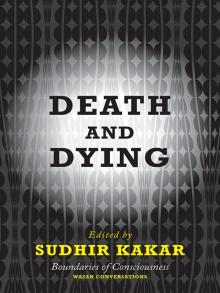 Death and Dying
Death and Dying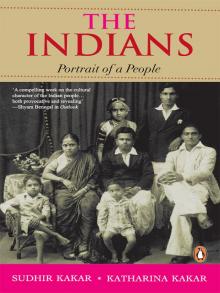 The Indians
The Indians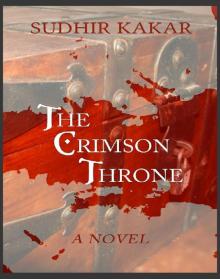 The Crimson Throne
The Crimson Throne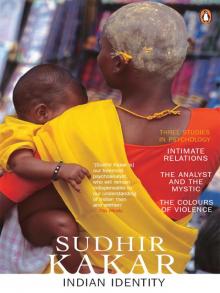 Indian Identity
Indian Identity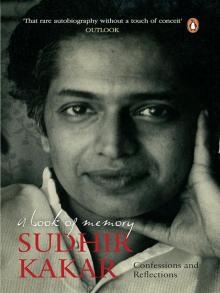 A Book of Memory
A Book of Memory